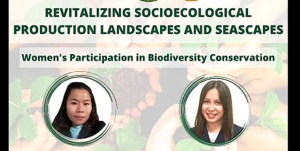
The fifth installment of the Revitalizing Socio-ecological Production Landscapes and Seascapes (SEPLS) webinar series discussed the importance of women’s role in biodiversity conservation and natural resources management concentration in the Lao People’s Democratic Republic (PDR). It was held on 28 July 2022 via Zoom.
The webinar was graced by Ms. Sysomphane Sengthavideth, Environment Outreach Consultant at GFA Consulting Group, and Dr. Finaflor Taylan, Director of Office and Gender Concerns of the University of the Philippines Open University (UPOU), to discuss the frameworks and strategies for broadening women empowerment in natural resources management.
There are factors that limit women’s participation in Nam Et-Phou Louey National Protected Area (NPEL NPA), an ecotourism model in Lao PDR shared by Ms. Sengthavideth. These factors mostly include time, knowledge, ability, experience, social, culture, income, language, leadership, rights, and ownership.
For women to better understand activities in biodiversity conservation and empower their participation, Ms. Sengthavideth discussed some of the recommendations to promote women’s engagement at all levels, especially in meetings, workshops, and training; to empower women’s rights to be equal with men’s—and give them the chance to take on leadership roles; to encourage and allow women to share ideas and give recommendations; and to support women in activities in the various programs of natural resources management.
Similarly, Dr. Taylan shared that women’s participation is important. Like Ms. Sengthavideth, Dr. Taylan believed that women should be involved in all aspects; thus, the right to participation is, after all, a basic human right. Looping in women in activities such as natural resources management and biodiversity conservation can lead to gender mainstreaming, which also means complying with the policy in government institutions in the Philippines. Furthermore, more than compliance itself, involving women can result in gender equality not only in environmental management. It can also lead to better situations where additional value applies to women in terms of access to benefits and resources; and more importantly, it can also advance sustainable initiatives, sustainability-specific programs, and quality life for all.
This fifth installment of the webinar series was hosted by Ms. Anne Frances Buhay. The series aims to discuss socio-ecological production landscapes and seascapes through emerging interdisciplinary research (EIDR) to build climate-smart communities. In collaboration with the UP Open University (UPOU) and Philippine Sayotama, this series invited experts from the fields of biodiversity and natural resources management. The recorded fifth installment of the webinar can be watched via the Philippine Sayotama YouTube Channel.
Written by Alessa Shainne Hostalero
Edited by Myra C. Almodiel and Pinky Halos







